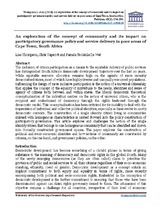An exploration of the concept of community and its impact on participatory governance policy and service delivery in poor areas of Cape Town, South Africa
Date
2018Author
Thompson, Lisa
Tapscott, Chris
De Wet, Pamela Tsolekile
Metadata
Show full item recordAbstract
The inclusion of citizen participation as a means to the equitable delivery of public services has distinguished South Africa’s democratic development trajectory over the last 20 years. While equitable resource allocation remains high on the agenda of more recently democratised states, most of which have highly diverse and unequally resourced populations. Influencing the design of more inclusive participation is the notion of a universal citizenship that applies the concept of the equality of individuals to the needs, identities and sense of agency of citizens both between and within states. The liberal democratic theoretical conceptualisation of the individual centres on the notion of universal citizen, who is the recipient and embodiment of democracy through the rights bestowed through the democratic model. This conceptualisation has been criticised for its inability to deal with the imprecision of individual and collective political identities, especially as these evolve in newly democratic contexts. The construction of a single identity citizen living in communities imbued with homogenous characteristics is carried forward into the policy construction of participatory governance. This article explores and challenges the notion of the single identity citizen that belongs to one homogenous community that can be identified and drawn into formally constructed government spaces. The paper explores the construction of political and socio-economic identities and how notions of community are constructed by citizens, on the one hand, and government policies, on the other.

